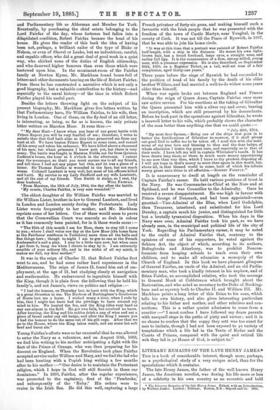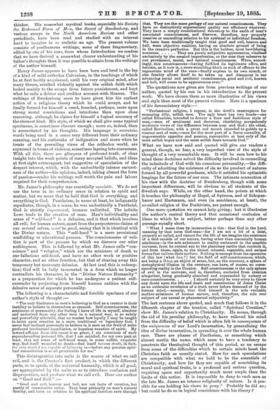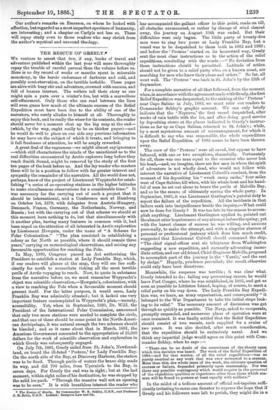LITERARY REMAINS OF THE LATE HENRY JAMES, THIS is a
book of considerable interest, though more, perhaps, as a psychological study of a very unique mind, than for the speculations which it contains.
The late Henry James, the father of the well known Henry James, the American novelist, was during his life more or less of a celebrity in his own country as an eccentric and bold
* The Literary Remains of the late Henry James Edited. with an Introduction, by William James. London : TrUbner. Boston, U.S.: Osgood and Co. 1885.
thinker. His somewhat mystical books, especially his Society the Redeemed Form of Hon, the Secret of Swedenborg, and various essays in the North American Review and other periodicals, have been read and studied with an interest hard to imagine in so realistic an age. The present volume consists of posthumous writings, some of them fragmentary, edited by one of his sons, from whose Introduction we confess that we have derived a somewhat clearer understanding of his father's thoughts than it was possible to attain from the writings of the author himself.
Henry James appears to have been born and bred in the lap of a kind of mild orthodox Calvinism, in the teachings of which he at first tacitly acquiesced, until his very original mind, after many throes, revolted violently against the selfish faith which looked mainly to the escape from future punishment, and kept what he calls a debtor and creditor account with Heaven. The writings of Swedenborg seem to have given him his earliest notion of a religions theory which he could accept, and he finally formed for himself a creed, founded, perhaps, more upon strong moral convictions and intuitions than upon close reasoning, although he claims for himself a logical accuracy of the sternest kind. His style, of which we shall give some typical specimens, is sometimes obscure enough ; more so, indeed, than is necessitated by his thoughts. His language is eccentric, words being used in a sense very different from their ordinary meaning, and his outbreaks of indignation and scorn when he treats of the prevailing views of the orthodox world, are expressed in terms of violence, sometimes lapsing into coarseness. With all this, there are glimpses of profound truth, of clear insight into the weak points of many accepted beliefs, and ideas at first sight extravagant, but suggestive of speculation of the deepest interest, which, with the undoubtedly intense earnest- ness of the author—his opinions, indeed, taking almost the form of passion—render his writings well worth the pain and labour required for their comprehension.
Mr. James's philosophy was essentially monistic. We do not use the term in its ordinary sense in relation to spirit and matter, but we mean that he held that God is everything, and everything is God. Pantheism, in name at least, he indignantly repudiates, though, in a sense, he was undoubtedly a Pantheist.
God is strictly impersonal, because unlimited. The infinite Love leads to the creation of man. Man's individuality and sense of "self-hood " is a delusion, and is that which involves
all evil; for human nature, apart from the preposterous claims of our several selves, must be good, seeing that it is identical with the Divine nature. This " self-hood " is a mere provisional scaffolding or educational process. The consciousness of voli- tion is part of the process by which we discover our utter nothingness. This is followed by what Mr. James calls " con- science " and "religion," which are the ministers of death to our fallacious self-hood, and have no other work or positive character, and no other function, but that of clearing away this temporary but necessary delusion. At last (and this is redemp- tion) God will be fully incarnated in a form which no longer contradicts his character, in the " Divine Nature Humanity" as a preparation for which he has undergone a patient self- surrender by projecting from himself human entities with the delusive sense of separate personality.
The following is a characteristic and forcible specimen of our author's style of thought :—
" The only hindrance to men's believing in God as a creator is their inability to believe in themselves as created. Self-consciousness, the sentiment of personality, the feeling I have of life in myself, absolute and underived from any other save in a natural way, is so subtly and powerfully atheistic, that no matter how loyally I may be taught to insist upon creation as a mere traditional or legendary fact, I never feel inclined personally to believe in it save as the fruit of some profound intellectual humiliation, or hopeless vexation of spirit. My inward afflatus from this cause is so great, I am conscious of such superabounding personal life that I am satisfied, for my own part at least, that my sense of self.hood must, in some subtle, exquisite way, find itself wounded to death—find itself become death, in fact, the only death I am capable of believing in—before any genuine spiri- tual resuscitation is at all practicable for me."
This disintegration into units is the source of what we call evil, and is the Creator's first product, in which the different parts, so to speak, of the universal humanity, which is all good, are appropriated by the units so as to introduce confusion and disproportion, and produce what we call evil. Hear our author on "Good and Evil" :—
"Good and evil, heaven and hell, are not facts of creation, but purely of constitutive order. They bear primarily on man's natural destiny, and have no relation to his spiritual freedom save through
that. They are the mere geology of our natural consciousness. They have no distinctively supernatural quality nor efficiency whatever. They have a simply constitutional relevancy to the earth of man's associated consciousness, and disavow, therefore, any properly creative or controlling relation to his spiritual or individual freedom. We have been traditionally taught that good and evil, heaven and hell, were objective realities, having an absolute ground of being in the creative perfection. But this is the baldest, most bewildering nonsense They are purely subjective appearances, vitalised exclusively by the created imperfection, or the uses they subserve to our provisional, moral, and rational consciousness. When, accord- ingly, this consciousness—having fulfilled its legitimate office, and become, as it now is, a mere stumbling-block or rock of offence to the regenerate mind of the race—finally expires in its own stench, or else frankly allows itself to be taken up and disappear in our advancing atheist and aesthetic consciousness, good and evil, heaven and hell, will cease to be appearances even."
The quotations now given are from previous writings of our author, quoted by his son in his introduction to the present work. We have chosen them as more illustrative of his views and style than most of the present volume. Here is a specimen of his denunciatory style :—
"Professional religion, I repeat, is the devil's masterpiece for ensnaring silly, selfish men. The ugly beast has two heads—one called Ritualism, intended to devour a finer and fastidious style of men,—men of sentiment and decorum, cherishing scrupulously moderate views of the difference between man and God ; the other, called Revivalism, with a great red month intended to gobble up a coarser sort of men,—men for the most part of a fierce carnality, of ungovernable appetite and passion, susceptible at best only of the most selfish hopes and the most selfish fears towards God."
What we have now said and quoted will give our readers a general, though, we fear, a very imperfect view of the style of thought of a very remarkable man. It will be seen how to his mind these doctrines solved the difficulty involved in reconciling the infinitude of God with his conscious personality,—the diffi- culty of admitting the existence of sin as the product of natures formed by all-powerful goodness, while it satisfied his optimistic longings for the future of our race. The intimate connection of his view with the doctrine of Swedenborg, though with some important differences, will be obvious to all students of the Swedish sage. While, on the other hand, the points at which it touches the philosophy of Hegel, of Spinoza, and of Schopen- haner and Hartmann, and even (in semblance, at least), the so-called religion of the Positivists, are patent enough.
One more quotation we cannot help giving; but it illustrates the author's central theory and that occasional confusion of ideas to which he is subject, better perhaps than any other passage equally short.
"What I mean then by incarnation is this : that God in the Lord, meaning by that term God-man—for I am not a bit of a deist, properly so called, and cannot for the life of me imagine the existence of a God outside of our nature, having other than essentially human attributes—is the sole substance in reality embraced in the sensible universe, from its central sun to the planetary earths that encircle it, and from these, again, to the tiniest mineral, vegetable, and animal forms that enliven their surface. Nothing is exempt from the operative of this law [what law ?] but the field of self-consciousness, which, not being a thing, an object of sense, but, on the contrary, a sphere of metaphysical illusion in the creature, can have, of course, no corre- sponding reality in the Creator. Self .consciousnessis the only sphere of evil in the universe, and is, therefore, excluded from creation altogether, being gradually absorbed and superseded by unitary or
race-consciousness I should certainly be very sorry to throw any doubt upon the life and death and resurrection of Jesus Christ as an authentic revelation of a truth never before dreamed of by the human mind,—namely, that God himself is the sole veritable mother-substance of human nature, and, therefore, the sole real subject of our unreal or phenomenal subjectivity."
The last sentence above quoted, and much that follows it in the fifteenth chapter of the treatise, called "Spiritual Creation," show Mr. James's relation to Christianity. He seems, through the aid of his peculiar philosophy, to have relieved his mind from the difficulty of belief which is often felt in consequence of the uniqueness of our Lord's incarnation, by generalising the idea of divine incarnation, in spreading it over the whole human race. There are phases of Pantheism, or something which almost merits the name, which seem to have a tendency to penetrate the theological thought of this period, as an escape from some of the difficulties which to certain minds beset the Christian faith as usually stated. How far such speculations are compatible with what we hold to be the essentials of Christianity, and how far they are capable of nourishing its moral and spiritual fruits, is a profound and serious question, requiring space and opportunity much more ample than the limits of this notice. It is impossible to deny to such men as the late Mr. James an intense religiosity of nature. Is it pos- sible for one holding his views to pray ? Probably he did so ; but could he do so in logical consistence with his theory P
Our author's remarks on Emerson, on whom he looked with affection, but regarded as a most imperfect specimen of humanity, are interesting; and a chapter on Carlyle not leas so. These will repay study even to those readers who may shrink from the author's mystical and unsound theology.




































 Previous page
Previous page